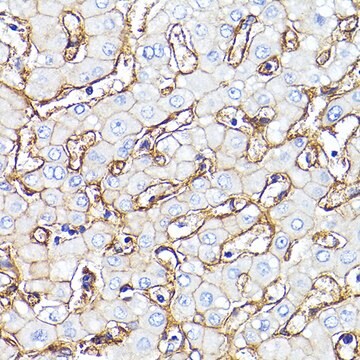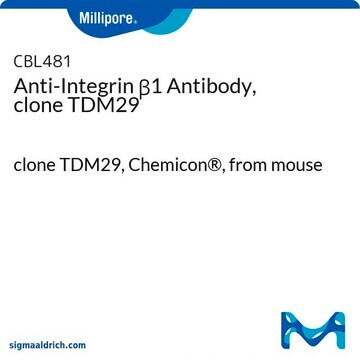MABT1502
Anti-Integrin beta-1 Antibody, clone 102DF5
clone 102DF5, from mouse
Synonym(s):
Fibronectin receptor subunit beta, Glycoprotein IIa, GPIIA, VLA-4 subunit beta, CD29
About This Item
Recommended Products
biological source
mouse
antibody form
purified antibody
antibody product type
primary antibodies
clone
102DF5, monoclonal
species reactivity
human
packaging
antibody small pack of 25 μg
technique(s)
ELISA: suitable
flow cytometry: suitable
immunofluorescence: suitable
immunohistochemistry: suitable (paraffin)
immunoprecipitation (IP): suitable
western blot: suitable
isotype
IgG1κ
NCBI accession no.
UniProt accession no.
target post-translational modification
unmodified
Gene Information
human ... ITGB1(3688)
Related Categories
General description
Specificity
Immunogen
Application
Immunofluorescence Analysis: A representative lot detected Integrin beta-1 in Immunofluorescence applications (Cartier-Michaud, A., et. al. (2012). PLoS One. 7(2):e32204; Balzac, F., et. al. (1993). J Cell Biol. 121(1):171-8; Lin, Y.N., et. al. (2015). Oncotarget. 6(21):18577-89).
Western Blotting Analysis: A representative lot detected Integrin beta-1 in Western Blotting applications (Balzac, F., et. al. (1993). J Cell Biol. 121(1):171-8).
ELISA Analysis: A representative lot detected Integrin beta-1 in ELISA applications (Jovanovic, M., et. al. (2010). Act Histochem. 112(1):34-41).
Immunoprecipitation Analysis: A representative lot immunoprecipitated Integrin beta-1 in Immunoprecipitation applications (Balzac, F., et. al. (1993). J Cell Biol. 121(1):171-8).
Cell Structure
Quality
Immunohistochemistry (Paraffin) Analysis: A 1:250 dilution of this antibody detected Integrin beta-1 in human uterus and human kidney tissue sections.
Target description
Physical form
Storage and Stability
Other Notes
Disclaimer
Not finding the right product?
Try our Product Selector Tool.
Storage Class Code
12 - Non Combustible Liquids
WGK
WGK 1
Certificates of Analysis (COA)
Search for Certificates of Analysis (COA) by entering the products Lot/Batch Number. Lot and Batch Numbers can be found on a product’s label following the words ‘Lot’ or ‘Batch’.
Already Own This Product?
Find documentation for the products that you have recently purchased in the Document Library.
Our team of scientists has experience in all areas of research including Life Science, Material Science, Chemical Synthesis, Chromatography, Analytical and many others.
Contact Technical Service






